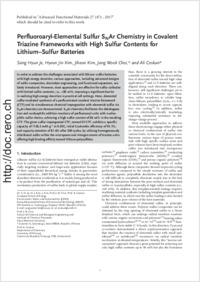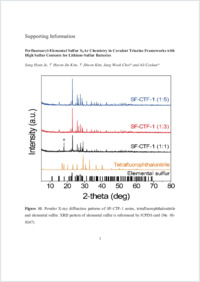Perfluoroaryl‐elemental sulfur SNAr chemistry in covalent triazine frameworks with high sulfur contents for lithium–sulfur batteries
- Je, Sang Hyun Graduate School of Energy, Environment, Water, and Sustainability (EEWS), Korea Advanced Institute of Science and Technology (KAIST), Yuseong-gu, Daejeon, Republic of Korea
- Kim, Hyeon Jin Graduate School of Energy, Environment, Water, and Sustainability (EEWS), Korea Advanced Institute of Science and Technology (KAIST), Yuseong-gu, Daejeon, Republic of Korea
- Kim, Jiheon Graduate School of Energy, Environment, Water, and Sustainability (EEWS), Korea Advanced Institute of Science and Technology (KAIST), Yuseong-gu, Daejeon, Republic of Korea
- Choi, Jang Wook Graduate School of Energy, Environment, Water, and Sustainability (EEWS), Korea Advanced Institute of Science and Technology (KAIST), Yuseong-gu, Daejeon, Republic of Korea - School of Chemical and Biological Engineering and Institute of Chemical Processes, Seoul National University, Gwanak-gu, Seoul, Republic of Korea
- Coskun, Ali Graduate School of Energy, Environment, Water, and Sustainability (EEWS), Korea Advanced Institute of Science and Technology (KAIST), Yuseong-gu, Daejeon, Republic of Korea - Department of Chemistry, University of Fribourg, Switzerland
-
01.12.2017
Published in:
- Advanced Functional Materials. - 2017, vol. 27, no. 47, p. 1703947
English
In order to address the challenges associated with lithium–sulfur batteries with high energy densities, various approaches, including advanced designs of sulfur composites, electrolyte engineering, and functional separators, are lately introduced. However, most approaches are effective for sulfur cathodes with limited sulfur contents, i.e., <80 wt%, imposing a significant barrier in realizing high energy densities in practical cell settings. Here, elemental sulfur-mediated synthesis of a perfluorinated covalent triazine framework (CTF) and its simultaneous chemical impregnation with elemental sulfur via SNAr chemistry are demonstrated. SNAr chemistry facilitates the dehalogenation and nucleophilic addition reactions of perfluoroaryl units with nucleophilic sulfur chains, achieving a high sulfur content of 86 wt% in the resulting CTF. The given sulfur-impregnated CTF, named SF-CTF, exhibits a specific capacity of 1138.2 mAh g−1 at 0.05C, initial Coulombic efficiency of 93.1%, and capacity retention of 81.6% after 300 cycles, by utilizing homogeneously distributed sulfur within the micropores and nitrogen atoms of triazine units offering high binding affinity toward lithium polysulfides.
- Faculty
- Faculté des sciences et de médecine
- Department
- Département de Chimie
- Language
-
- English
- Classification
- Chemistry
- License
-
License undefined
- Identifiers
-
- RERO DOC 306724
- DOI 10.1002/adfm.201703947
- Persistent URL
- https://folia.unifr.ch/unifr/documents/306282
Other files
Statistics
Document views: 124
File downloads:
- pdf: 508
- Supplementary material: 295

